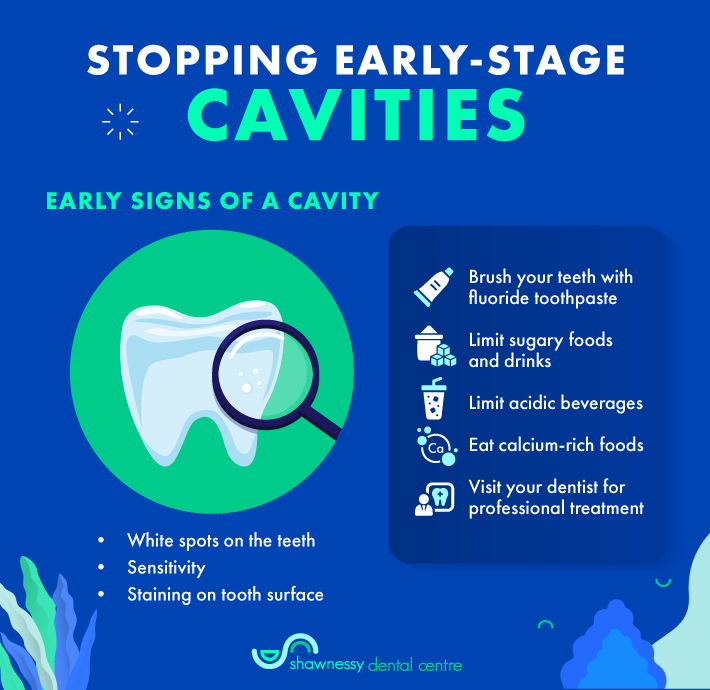Cavities are a common dental problem affecting people of all ages. They can cause discomfort, lead to more serious oral health issues, and even impact your overall well-being.
While the best way to avoid tooth decay is to prevent it from happening in the first place, it is possible to reverse a cavity in its early stages. It can be done through remineralization, which requires adding minerals to strengthen your enamel.
If you suspect you have a cavity, book an appointment with your dentist. If it’s in its early stages, they may recommend strategies to reverse the cavity, which may be done in-office or at home.
Understanding Cavities
Cavities are damaged areas in the hard surface of your teeth that develop into tiny openings or holes. They can be caused by a combination of factors, including bacteria in your mouth, frequent snacking, sipping sugary drinks, and poor oral hygiene. When left untreated, cavities can lead to toothache, infection, and tooth loss.
How Cavities Develop
The development of cavities begins with the presence of oral bacteria. These bacteria feed on the sugars and starches in your food, producing acids that attack the enamel, the outermost layer of your teeth. Over time, these acid attacks can erode the enamel and create cavities.
The Role of Oral Bacteria
Oral bacteria play a crucial role in the formation of cavities. Streptococcus mutans and Lactobacillus are the primary culprits. These bacteria metabolize sugars and produce lactic acid, which demineralizes the enamel. Without proper oral hygiene practices, these bacteria can thrive and continue to damage your teeth.
How Are Cavities Reversed?
The concept of reversing cavities revolves around remineralization. Remineralization is the natural process of restoring minerals to the tooth enamel. It can help repair early-stage cavities before they progress.
Remineralization Explained
Remineralization occurs when minerals like calcium, phosphate, and fluoride are redeposited onto the enamel from saliva and other sources. This process can help strengthen the enamel and reverse early demineralization.
Signs of Early-Stage Cavities
Early-stage cavities, or incipient lesions, may appear as white spots on the teeth. These spots indicate areas where the enamel has started to lose minerals. At this stage, remineralization can effectively halt the progression of the cavity.
Promoting Remineralization
To promote remineralization, a healthy oral environment is essential. Good habits include practicing good oral hygiene, using fluoride toothpaste, and consuming a balanced diet rich in minerals. Regular dental checkups can also help monitor the progress of remineralization.
Effective Preventative Strategies
Preventing cavities is the best approach to maintaining dental health. Adopting effective preventative strategies can reduce the risk of cavities.
Brush and Floss Regularly
Brushing your teeth twice daily with fluoride toothpaste and flossing daily are fundamental oral hygiene practices. They help remove plaque, prevent the buildup of harmful bacteria, and maintain the integrity of your enamel.

Limit Sugary Foods and Drinks
Sugary foods and drinks provide a feast for cavity-causing bacteria. Limiting your consumption of sugary snacks, sodas, and candies can significantly reduce the risk of cavities. Opt instead for healthier alternatives like fruits, vegetables, and water.
Rinse with Mouthwash
Using an antimicrobial mouthwash can help reduce the number of bacteria in your mouth. Look for mouthwashes that contain fluoride, as they can further enhance the remineralization process and protect your teeth from cavities.
Professional Intervention
While preventive measures are crucial, professional dental treatments are vital in cavity reversal and oral health. Dentists can provide targeted interventions to address early-stage cavities and prevent them from progressing.
Fluoride Treatments
Fluoride is a natural mineral that strengthens tooth enamel and helps prevent cavities. Professional fluoride treatments, such as fluoride varnish or gel, can provide a concentrated dose of fluoride to support remineralization and protect against cavities.
Dental Sealants
Dental sealants are thin, protective coatings applied to the chewing surfaces of the back teeth. They create a barrier that prevents food particles and bacteria from getting trapped in the grooves and pits of the teeth, reducing the risk of cavities.
Regular Dental Checkups
Regular dental checkups are essential for early detection and intervention. Dentists can identify early signs of cavities, provide professional cleanings, and offer personalized recommendations to maintain optimal oral health.
The Role of Diet
Your diet plays a significant role in preventing and reversing cavities. By making mindful choices about what you eat and drink, you can support your dental health and help reduce the risk of cavities.
Consume Calcium-Rich Foods
Calcium is a crucial mineral for maintaining strong teeth and bones. Incorporate calcium-rich foods like dairy products, leafy greens, and almonds into your diet to support remineralization and overall oral health.
Include Phosphorus-Rich Foods
Phosphorus works in tandem with calcium to strengthen tooth enamel. Foods like meat, fish, eggs, and nuts are excellent sources of phosphorus that can help protect your teeth from cavities.
Stay Hydrated
Drinking plenty of water throughout the day helps wash away food particles and bacteria, reducing the risk of cavities. Water also promotes saliva production, which is essential for remineralization and maintaining a healthy oral environment.
Keep Cavities at Bay
Reversing cavities is possible with the right knowledge, preventive strategies, and professional care. By understanding the mechanisms of cavity formation, promoting remineralization, and adopting a proactive approach to oral health, you can achieve and maintain a healthy, cavity-free smile.
If you’re ready to improve your dental health, book an appointment with Shawnessy Dental Centre. Our team is here to provide personalized care, professional treatments, and valuable guidance to help you achieve optimal oral health. Remember, a healthy smile reflects your overall well-being.


